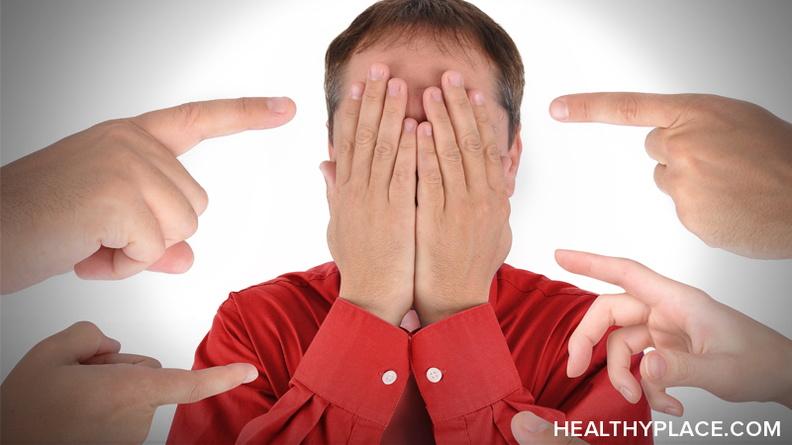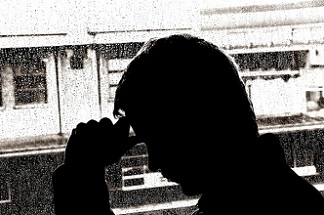Anxiety, Criticism, and Conquering Self-Doubt

The words "anxiety," "criticism," and "self-doubt" can be synonyms, closely knit word triplets. Those mere words indicate that anxiety has many effects that tend to make life difficult. One particularly annoying effect of anxiety is sensitivity to criticism. Feeling crushed by criticism is an effect of anxiety, in general, and social anxiety, in particular, where the fear of being judged or of embarrassment can be immense. When anxiety and criticism are overpowering and lead to self-doubt, take heart. There are ways to conquer self-doubt. with with anxiety and criticism
Anxiety and Criticism Cause Self-Doubt
My own self-doubt started when I was in kindergarten. I completed an assignment incorrectly (gasp). All the students around me did it right. I did it wrong. They earned smiley faces. I got a frown. That caused me such angst that I clearly remember every detail of the situation, and I know that this was the source of my social anxiety, perfectionism, fear of criticism, and self-doubt.
Is this not a bit of an overreaction to a kindergarten assignment? Probably. Okay, yes. That's the thing, though, with anxiety and criticism. For someone living with social anxiety, almost everything, even the most innocent statement, can be perceived as criticism. (Friend: "Cute socks. I have an outfit they'd go great with." Friend with anxiety and sensitivity to criticism: "Thanks." To self thinks, "Don't my socks go with my outfit? What are people thinking about the way I'm dressed?") Anxiety and criticism cause self-doubt.
Where Do Anxiety, Sensitivity to Criticism, and Self-Doubt Come From?
 According to cognitive behavioral therapy (CBT), the criticism isn't the problem. Many people shrug off even harsh criticism as the other person's problem, and they take constructive criticism for what it is: feedback designed to help build someone up.
According to cognitive behavioral therapy (CBT), the criticism isn't the problem. Many people shrug off even harsh criticism as the other person's problem, and they take constructive criticism for what it is: feedback designed to help build someone up.
CBT theory tells us that the criticism isn't the source of our discomfort. Anxiety and self-doubt arise because of how we interpret the criticism. It's our thoughts about criticism that can lead to anxiety and self-doubt, which means that we can conquer the awful self-doubt that makes us miserable.
Our thoughts aren't always trustworthy. Cognitive behavioral theorists explain that many thoughts are irrational or faulty, and these contribute to anxiety and other mental health challenges. These thought patterns, in particular, contribute to anxiety and self-doubt that stem from criticism:
- All-or-nothing thinking: Also called black-or-white thinking; this thinking pattern contributes to perfectionism and thus anxiety and self-doubt. With this, if performance isn't perfect, it's worthless.
- Overgeneralization: People with social anxiety and fear of criticism often take one critical comment and equate it with complete and total failure. Self-doubt comes from not separating criticism from positive feedback.
- Jumping to conclusions/mind reading: Social anxiety makes us, consciously or subconsciously, watch people for nonverbal communication of critical opinions. We mind-read, assuming that someone is inwardly critical of us.
- Discounting the positive This is "yes-butting." Someone might be giving us positive feedback, but we dismiss it with self-doubt, believing we're really not worthy of the praise. Or we ignore all positive comments and instead dwell on that one criticism we received.
Even with Anxiety and Criticism, You Can Conquer Self-Doubt
It's possible to overcome the self-doubt and anxiety that come with criticism. The first step is to be aware that criticism is leading to anxiety and self-doubt. That's probably easy; because, if you live with social anxiety, chances are you are well aware of this connection.
Next, catch yourself engaging in one of the above negative thinking patterns. Become aware of how often you do it. Once your awareness is honed, you can begin to challenge your anxiety and self-doubt. Are your thoughts about criticism accurate? Look for evidence to counter your anxious thoughts, your anxiety-based overthinking. Focus on that evidence to realistically and powerfully reduce anxiety and self-doubt. Criticism will always happen, but it won't always lead to anxiety and self-doubt.
Let's connect. I blog here. Find me on Facebook, Twitter, LinkedIn, Instagram, and Pinterest. My mental health novels, including one about severe anxiety, are here.
APA Reference
Peterson, T.
(2016, March 3). Anxiety, Criticism, and Conquering Self-Doubt, HealthyPlace. Retrieved
on 2024, April 18 from https://www.healthyplace.com/blogs/anxiety-schmanxiety/2016/03/anxiety-criticism-and-conquering-self-doubt
Author: Tanya J. Peterson, MS, NCC, DAIS
how do you deal with self criticism where there is no external trigger? i struggle with overthinking badly and i challenge my thoughts but i cant stop thinking the thoughts even with good evidence that they aren't accurate. they just come back again.
Hi Gordon,
Thank you for this question. You raise a very important point that I think a great many people struggle with. This plagued me for a long time, and like you, I challenged my thoughts, found evidence to the contrary, etc. But it didn't help. These techniques are part of CBT, which has been proven to be very useful for many people for different situations. That doesn't mean that it works for everything and everybody. Challenging such critical thoughts can serve to reinforce those thoughts so they get stronger rather than weaker. Our mind can be really good at "yes-butting," making the evidence irrelevant. What worked for me, and what I've used with others, is acceptance and commitment therapy. It's an approach that has people accept their thoughts, even self-critical ones, so they can move forward toward what they want in life. (Acceptance doesn't mean buying into them or believing them to be true. It means acknowledging that they're there and doing things to move forward.) Working with a therapist can help a great deal, even if the therapist doesn't use ACT. A therapist can help you deal with the thoughts so they no longer rule your life. Do know that there isn't something wrong with you because challenging your thoughts doesn't work. That just means that this single approach is ineffective for you and that you can try other things.
Hi Eva,
My psychiatrist gave me a nice advice, properly breathing can help you with anxiety attacks, just need to relax and close your eyes, take slowly and deep breath few times, and trust me you will be perfect. That what is helping me now when attack comes, its rare but when is come i am ready to fight against him.
All the best
Srdan
It sounds terrible, but I find comfort in reading about other people's experiences with anxiety, social anxiety and depression. The first time I read a description of someone else's experience, it made me cry, because it was so similar to my own. Knowing that I am not alone has helped me come to terms with my mental health issues and to view them in a more constructive way, instead of seeing myself as defective and worthless.
Hello Eva Jean,
That doesn't sound terrible at all. Humanity is about shared experiences. There's true comfort in knowing we're not alone, and learning about others can help us understand ourselves and find new ideas for healing. That's why HealthyPlace exists!
I would like to say that anxiety disorder change my life for 360 degree. I have had so scare when first panic attack got me. I thought i will die, i cant describe that feeling, so awful. Sometimes i still fighting with this disorder, but i feel much better than before. The things be worser my first attack was in shopping centre, i ran to the rest room and lock myself into toilet. My ex-girlfriend was with me and she just ask me whats wrong why you suddenly start to run, i told her that my stomach is wrong, later i talked with my family and i decide to visit psychiatrist and that was good idea. Now is much better. Anyway, this article is great. I just started to write blog about anxiety.
Cheers
Hello srdan,
Thank you so much for sharing some of your own experience with anxiety and panic. Many people will be able to relate, and it's inspiring to know that your anxiety and panic are so much better -- and that a psychiatrist helped. Good luck to you with your blog about anxiety!
Thank you very much for response. I am sure that everybody can beat this awful feeling, with family support and love. Never give up, always look forward.
Best regards,
Srdan